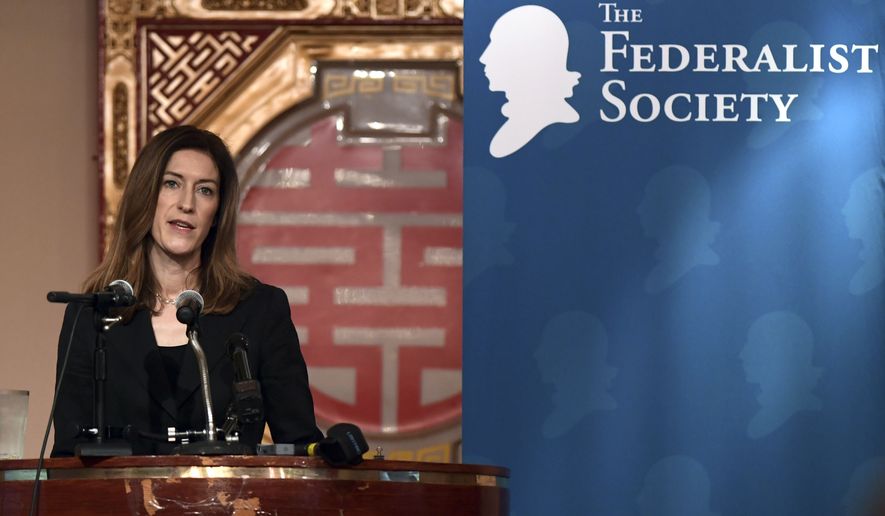Associate Attorney General Rachel Brand on Thursday denied reports that she is leaving the Justice Department because of fears she would be asked to oversee the Russia investigation.
In her first public remarks since her departure was announced Friday, Ms. Brand said leaving the Justice Department — where she was the No. 3 attorney — was bittersweet.
“I loved working at the Department of Justice,” she said. “I’d be happy to stay there much longer, but sometimes something comes up unexpectedly in your career and you can’t pass it up. That’s all there is to it.”
Ms. Brand’s remarks came Thursday in a speech before the Federalist Society, a D.C.-based legal think tank.
She is leaving the Justice Department to become Walmart’s executive vice president of global governance and corporate secretary. Her last day is next week.
Media outlets had reported Ms. Brand left out of fear she would be next in line to oversee Special Counsel Robert Mueller’s investigation into links between Russia and Donald Trump’s presidential campaign. Deputy Attorney General Rod Rosenstein is currently overseeing that probe because Attorney General Jeff Sessions had recused himself.
A memo from Republicans on the House Intelligence Committee shows that at least one questionable surveillance warrant application was signed by Mr. Rosenstein, who already had a difficult relationship with Mr. Trump. The memo alleges the surveillance warrant was obtained by using a partisan anti-Trump dossier funded by Hillary Clinton’s campaign and the Democratic Party.
After the memo surfaced, some speculated Mr. Trump would fire Mr. Rosenstein. When asked whether he had confidence in Mr. Rosenstein, the president dismissively responded, “You figure that one out.”
If Mr. Rosenstein left, Ms. Brand would be next in line to oversee the Russia investigation. That would have thrust Ms. Brand into a media firestorm and possibly the president’s crosshairs.
The Justice Department has denied claims that Ms. Brand’s departure is related to the possible firing of Mr. Rosenstein, calling such reports “false and frankly ridiculous.”
Ms. Brand also said the Justice Department will become more aggressive in reviewing class action settlements. Under the Class Action Fairness Act, a 2005 bill to address abuses in class action litigation, the attorney general must review the settlement’s fairness and offer an opinion to the court.
The Justice Department receives over 700 settlement notices every year, but has only participated in two cases more than a decade ago, Ms. Brand said. She blamed the lack of class-action review on government bureaucracy, saying the notices go through multiple mailrooms and take weeks to process and sort. Ms. Brand said sometimes the notices are scanned by X-ray machines in the mailroom, which renders any CDs inside the packages unreadable.
“On average it would take 70 days from receipt until a lawyer reviewed the notice,” she said. “Often, they weren’t reviewed by a lawyer until after the fairness hearing or even after the settlement had been finalized.”
Ms. Brand said the Justice Department may take its first action in a class-action settlement in the next few days.
• Jeff Mordock can be reached at jmordock@washingtontimes.com.




Please read our comment policy before commenting.